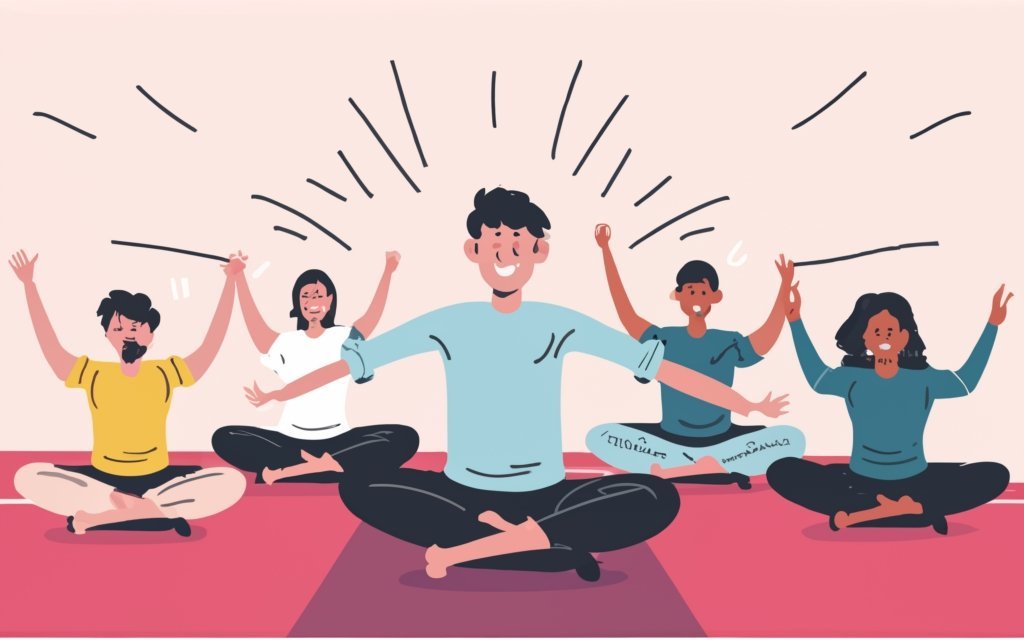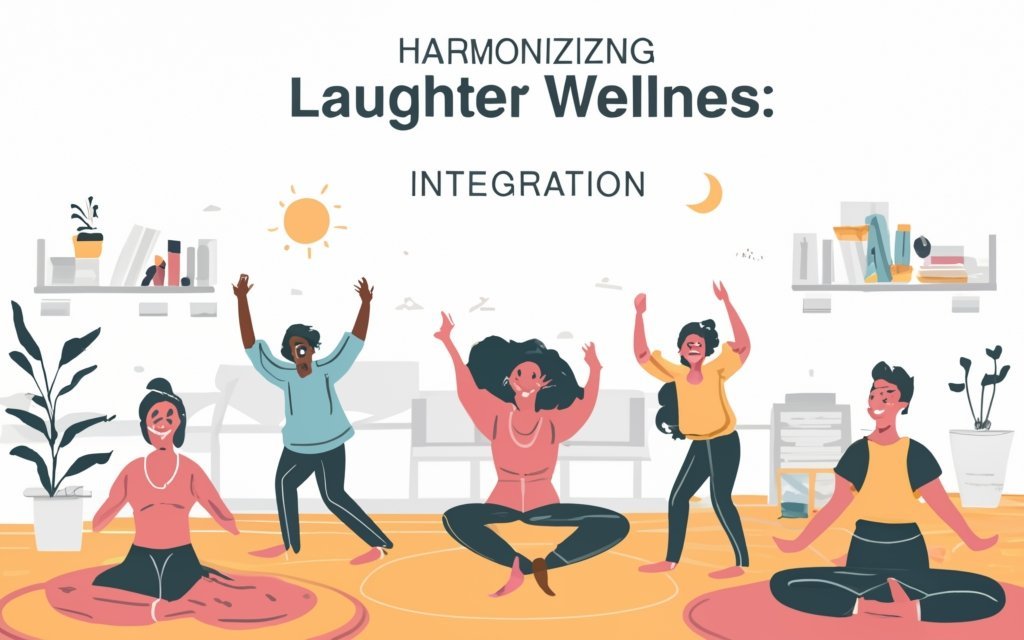Calling all humor enthusiasts! Get ready to roll on the floor with laughter as we explore the unbelievably hilarious world of Laughter Yoga. Yes, you heard it right – Laughter Yoga! No, we’re not talking about doing downward dog while laughing uncontrollably (although that does sound interesting). This unique lifestyle combines the ancient practice of yoga with the undeniable power of laughter to bring you a full body and mind experience like never before. So, throw away your serious faces and join the laughter revolution as we dive into the absurdity of this laughter-infused lifestyle. Buckle up and prepare to laugh till your abs hurt – no crunches required!

What is Laughter Yoga?
Laughter Yoga is a unique and innovative wellness practice that combines laughter exercises with yogic breathing techniques. Developed by Dr. Madan Kataria in 1995, this unconventional form of yoga has gained popularity worldwide for its ability to promote physical, mental, and emotional well-being through the simple act of laughter.
The origin and principles of Laughter Yoga
Laughter Yoga originated in Mumbai, India, when Dr. Madan Kataria, a medical doctor, noticed the numerous health benefits associated with laughter. Inspired by the notion that laughter is the best medicine, Dr. Kataria began organizing laughter sessions in a local park with just five participants. Today, Laughter Yoga has grown into a global movement, with thousands of laughter clubs and practitioners spreading joy and laughter in more than 100 countries.
The principles of Laughter Yoga are rooted in the understanding of the mind-body connection and the power of laughter to heal and transform. It combines controlled laughter exercises, deep breathing techniques, and childlike playfulness to evoke genuine laughter and its associated benefits.
How Laughter Yoga works
Laughter Yoga works on the premise that the body cannot differentiate between genuine and simulated laughter. By intentionally engaging in laughter exercises, the body goes through the same physiological and psychological processes as it would with spontaneous laughter. This practice allows for the infusion of joy and positivity, even in the absence of a humorous stimulus.
In a typical Laughter Yoga session, participants engage in a series of laughter exercises that include clapping, chanting, and playful movements. These exercises are combined with deep yogic breathing, which further promotes relaxation and the oxygenation of the body. The result is a profound sense of well-being and an uplifted mood.
The benefits of Laughter Yoga
Laughter Yoga offers a plethora of benefits that extend beyond a momentary feeling of joy. From physical health to emotional well-being, the following are just a few of the many benefits that can be derived from a regular Laughter Yoga practice:
-
Improved immune function: Laughter has been found to stimulate the production of antibodies and activate immune cells, boosting the body’s defense against illness and infection.
-
Stress relief: Laughter triggers the release of endorphins, the body’s natural feel-good chemicals, which help alleviate stress and promote relaxation.
-
Enhanced cardiovascular health: Laughter increases blood flow, improves circulation, and promotes heart health by reducing blood pressure and boosting oxygenation.
-
Mental health support: Laughter Yoga has been shown to reduce symptoms of depression and anxiety by increasing the production of serotonin, a neurotransmitter that promotes feelings of happiness and well-being.
-
Strengthened social connections: Laughter is contagious, and engaging in laughter exercises creates a sense of camaraderie and connection among participants, enhancing social bonds.
-
Improved respiratory function: The deep breathing techniques employed in Laughter Yoga exercises support better lung capacity and oxygenation, benefiting overall respiratory health.
-
Increased energy levels: Laughter is invigorating and can provide a natural energy boost, leaving participants feeling refreshed and revitalized.
-
Enhanced creativity and productivity: Laughter stimulates the brain, improving cognitive function and creativity, which can contribute to increased productivity and problem-solving abilities.
These benefits, among many others, make Laughter Yoga an attractive and accessible practice for individuals looking to improve their overall well-being while embracing the joy and positivity that laughter brings.
Getting Started with Laughter Yoga
Finding a Laughter Yoga class
If you’re ready to embark on your laughter journey, finding a Laughter Yoga class is the first step. Laughter Yoga classes can be found in various communities, fitness centers, and wellness studios. Online directories and social media groups dedicated to Laughter Yoga can be helpful in locating a class near you. When selecting a class, consider factors such as location, schedule, and the qualifications of the instructor.
Joining a Laughter Yoga club or group
For those seeking a more regular and community-oriented laughter experience, joining a Laughter Yoga club or group can provide a supportive and engaging environment. Laughter clubs often meet weekly or monthly and offer a space for individuals to come together and share laughter in a group setting. These clubs may also organize special events, workshops, and social activities centered around laughter and well-being.
Understanding the laughter exercises
Laughter Yoga exercises are simple yet effective techniques designed to induce laughter and create a joyful atmosphere. These exercises often involve simulated laughter, eye contact, childlike playfulness, and movements that encourage the body to loosen up and engage in laughter. Some exercises include “Gibberish Laughter,” where participants speak in a nonsensical language, and “Laughter Meditation,” which involves laughing in silence while focusing on the present moment. Understanding and practicing these exercises is key to fully experiencing the benefits of Laughter Yoga.
The Science behind Laughter
How laughter affects the brain and body
Laughter has a profound impact on both the brain and body. When laughter is triggered, the brain releases neurochemicals such as endorphins, dopamine, and serotonin, which contribute to feelings of happiness, relaxation, and overall well-being. Physiologically, laughter stimulates the respiratory system, increases heart rate and blood flow, and exercises various muscle groups, including the diaphragm, abdomen, and face.
The release of endorphins and stress relief
One of the key physiological effects of laughter is the release of endorphins. These natural painkillers and mood enhancers are produced by the brain and contribute to stress relief and a sense of euphoria. The act of laughing itself can also reduce levels of cortisol, the stress hormone, thereby promoting relaxation and helping individuals better navigate challenging situations.
Laughter Yoga and its positive impact on mental health

Laughter Yoga is particularly beneficial for mental health as it combines laughter with deep breathing exercises, which have been shown to reduce anxiety, depression, and overall psychological distress. Engaging in regular laughter exercises promotes a positive mindset, increased resilience, and improved emotional well-being. Additionally, the social aspect of Laughter Yoga can combat feelings of loneliness and isolation, fostering a sense of belonging and connectedness.
Incorporating Laughter Yoga into Daily Life
Laughter exercises at home
To bring the benefits of Laughter Yoga into your everyday life, incorporating laughter exercises into your home routine can be a fun and effective practice. You can start by setting aside a few minutes each day to intentionally laugh, using exercises learned in classes or laughter clubs. Whether it’s through watching funny videos, practicing laughter yoga alone, or involving your family members, laughter at home can create a positive and joyful atmosphere.
Laughter Yoga for workplace wellness
Laughter Yoga can be a valuable tool for promoting wellness and positive workplace culture. Encouraging laughter breaks or laughter sessions during meetings can help alleviate stress, increase team cohesion, and enhance productivity. Implementing simple laughter exercises or organizing laughter workshops in the workplace can provide employees with a fun way to relieve tension, boost morale, and create a more harmonious work environment.
Using Laughter Yoga as a social icebreaker
Laughter Yoga is an excellent icebreaker for social gatherings and events. By introducing laughter exercises into social settings, individuals can quickly connect, break down barriers, and create a light-hearted atmosphere. Laughter breaks the ice, creating a shared experience that brings people together and facilitates communication. Whether it’s a family reunion, party, or team-building activity, Laughter Yoga can set the tone for a joyful and memorable occasion.
Laughter Yoga and Physical Health
Boosting the immune system through laughter
Laughter has a profound impact on the immune system, making Laughter Yoga an effective practice for maintaining physical health. Studies have shown that laughter increases the production of antibodies and activates immune cells, boosting the body’s defense mechanisms. Regular laughter exercises can enhance the immune response, helping to prevent illnesses and improve overall well-being.
Laughter Yoga for pain management
Laughter has natural pain-relieving properties due to the release of endorphins, the body’s natural painkillers. Laughter Yoga can be used as a complementary practice for managing chronic pain or discomfort. By engaging in laughter exercises, individuals can experience temporary relief from pain, as laughter triggers the release of endorphins and distracts the mind from the sensation of pain.
The role of laughter in cardiovascular health
Laughter has been found to have positive effects on cardiovascular health. It improves blood circulation, dilates blood vessels, and reduces blood pressure, all of which contribute to a healthier cardiovascular system. Regular laughter exercises in the form of Laughter Yoga can support heart health, reduce the risk of cardiovascular diseases, and improve overall cardiovascular function.
Laughter Yoga: A Tool for Emotional Well-being
Laughter Yoga and stress reduction
Laughter is a powerful stress buster, and Laughter Yoga provides an effective outlet for releasing tension and reducing stress levels. By engaging in laughter exercises, individuals can experience a sense of relaxation, as laughter triggers the release of endorphins and promotes a positive mindset. Laughter Yoga helps individuals manage stress by providing a healthy and enjoyable way to cope with life’s challenges.
Improving self-confidence and self-esteem through laughter
Laughter Yoga can boost self-confidence and self-esteem, as it encourages individuals to embrace an authentic, childlike playfulness. The non-judgmental nature of laughter exercises allows individuals to let go of inhibitions and self-consciousness, fostering a sense of acceptance and self-empowerment. By engaging in laughter, individuals can develop a positive self-image and cultivate a greater sense of self-worth.
Laughter as a coping mechanism for anxiety and depression

Laughter can serve as a valuable coping mechanism for anxiety and depression. When laughter is evoked, the brain releases serotonin, a neurotransmitter that promotes feelings of happiness and well-being, while reducing levels of stress hormones. Engaging in regular laughter exercises with the support of Laughter Yoga can help alleviate symptoms of anxiety and depression, providing individuals with a natural and enjoyable means of managing their mental health.

The Social Benefits of Laughter Yoga
Building connections and fostering relationships through laughter
Laughter Yoga offers a unique opportunity to build connections and foster relationships through shared laughter experiences. Engaging in laughter exercises with others creates a sense of camaraderie, breaks down social barriers, and promotes empathy and understanding. Whether in a laughter club or social gathering, laughter brings people together and encourages the formation of meaningful relationships.
Breaking down barriers and promoting inclusivity
Laughter has the power to break down barriers and promote inclusivity. In laughter spaces, individuals can connect regardless of age, gender, race, or background. Laughter Yoga encourages a non-judgmental and accepting atmosphere, where everyone is invited to participate and contribute to the collective experience. This inclusivity fosters a sense of belonging and appreciation for the diverse range of individuals and perspectives present.
The role of laughter in enhancing communication skills
Laughter Yoga can enhance communication skills by creating an open and receptive environment for interaction. Laughter exercises encourage active listening, empathy, and non-verbal communication skills. When individuals engage in shared laughter, it strengthens social bonds, improves understanding, and facilitates effective communication. Laughter Yoga provides a safe space for individuals to practice and develop these important communication skills.
Laughter Yoga for Personal Development
Laughter as a tool for personal growth and self-discovery
Laughter can be a powerful tool for personal growth and self-discovery. Through Laughter Yoga, individuals have the opportunity to explore their authentic selves, let go of inhibitions, and connect with their inner childlike joy. Engaging in laughter exercises can unlock creativity, boost self-expression, and encourage personal transformation. Laughter serves as a gateway to accessing inner wisdom, fostering personal growth, and discovering new facets of oneself.
Finding joy and gratitude through laughter
Laughter Yoga promotes the cultivation of joy and gratitude as essential components of well-being. By actively engaging in laughter exercises, individuals can shift their focus from negativity to positivity, allowing themselves to experience joy in the present moment. With regular practice, laughter becomes a pathway to gratitude, as individuals discover that even in challenging situations, there is always room for laughter and appreciation.
Overcoming fear and embracing vulnerability with laughter
Laughter has the power to help individuals overcome fear and embrace vulnerability. Laughter Yoga encourages individuals to step outside their comfort zones, let go of inhibitions, and face their fears with a spirit of playfulness. By engaging in laughter exercises that require a level of vulnerability, individuals can develop resilience, build self-confidence, and unlock their true potential.
Laughter Yoga in Special Settings
Laughter Yoga in hospitals and healthcare facilities
Laughter Yoga is increasingly being implemented in hospitals and healthcare facilities as a complementary therapy to support patient well-being. Laughter exercises can help in reducing anxiety and stress levels among patients, improve patient and caregiver relationships, and provide a sense of hope and positivity in challenging medical situations. Laughter Yoga has also been found to enhance pain management and support overall recovery processes.
Laughter Yoga for seniors and elderly care
Laughter Yoga has shown remarkable benefits for seniors and individuals in elderly care. Engaging in laughter exercises improves cognitive function, increases social interaction, and enhances overall well-being. Laughter breaks isolation, combats feelings of loneliness and depression, and contributes to a higher quality of life for seniors. Laughter Yoga can be practiced in senior centers, nursing homes, or even in the comfort of one’s own home.
Laughter Yoga in educational settings
Laughter Yoga has found its place in educational settings, benefiting students and teachers alike. By incorporating laughter exercises into the curriculum, educators can create a vibrant and joyful learning environment. Laughter promotes better focus, improved memory retention, and enhanced creativity, fostering optimal learning experiences. Additionally, laughter in the classroom strengthens relationships, reduces stress levels, and promotes a positive school culture.
Maintaining a Laughter Yoga Practice
Tips for staying committed to a regular laughter practice
To maintain a laughter practice, consistency is key. Here are a few tips for staying committed to your laughter journey:
-
Set a schedule: Dedicate specific times in your week for laughter exercises, making it a non-negotiable part of your routine.
-
Find a laughter buddy: Partner with a friend or family member to practice laughter exercises together. Having someone to share the experience with can provide motivation and accountability.
-
Mix it up: Explore various laughter exercises and techniques to keep your practice interesting and engaging. Incorporate new exercises, games, or props to keep the laughter flowing.
-
Celebrate milestones: Recognize and celebrate your progress along the way. Whether it’s completing a laughter challenge or noticing the positive effects of laughter in your life, acknowledge and appreciate the impact of your laughter practice.

Combining laughter with other wellness activities
Laughter Yoga can be complemented by other wellness activities to enhance its benefits. Consider incorporating mindfulness practices, such as meditation or yoga, into your laughter routine. These practices can help deepen the mind-body connection and create a holistic approach to well-being. Additionally, engaging in physical exercises, such as walking or dancing, can further amplify the positive effects of laughter and promote overall wellness.
Continuing education and deepening knowledge of Laughter Yoga
To deepen your knowledge and enhance your laughter practice, consider furthering your understanding of Laughter Yoga. Attend workshops, trainings, or seminars conducted by certified Laughter Yoga instructors. Explore books, podcasts, and online resources dedicated to the subject. By staying informed and continuously expanding your knowledge, you can optimize the benefits of Laughter Yoga and share the joy with others.
Laughter Yoga offers an alternative and lighthearted approach to wellness. From its origin and principles to the science behind laughter and its holistic benefits, this comprehensive article has provided a humorous and informative exploration of the Laughter Yoga lifestyle. Whether you’re seeking physical health improvements, emotional well-being, social connections, or personal development, Laughter Yoga invites you to embrace the power of laughter and embark on a joy-filled journey. So, why not give it a try? Unleash your inner laughter and let the positive energy reverberate within you. Remember, laughter is contagious, and the world could always use a little more laughter!



